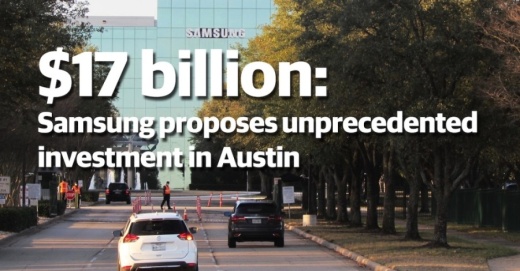Samsung Semiconductor, under the guise of Silicon Silver, is shopping around a new 6.1 million-square-foot chipmaking plant that comes with a $17 billion investment—$6 billion in structure and other real estate developments and $11 billion worth of personal property in machinery and equipment—according to the documents. The project would bring up to 1,993 jobs, 1,800 of which carry average salaries of about $100,000. The project would be among the largest single economic investments in Texas history and the largest single investment in the Austin area, easily surpassing recent billion-dollar projects such as the Tesla Gigafactory in 2020 and the Apple campus in 2018.
According to documents, Samsung rejected a city offer that included nearly $650 million in economic incentives over a 10-year span. The proposal would have been a record corporate incentive from the city, exponentially topping the current record—a still active incentive package, initially estimated at $62.9 million, offered to Samsung in 2006 for its existing $4 billion chip manufacturing plant, according to economic incentive data from the city.
However, Samsung wants more for its latest mega-project and has asked for a 100% tax reimbursement over a 25-year term.
In an email to Community Impact Newspaper, a spokesperson with the Austin Economic Development Department said the city does not comment on "economic development prospects." Samsung Semiconductor's director of communications, Michele Glaze, declined to confirm any information related to the project and told Community Impact Newspaper that nothing has been decided. Austin has the ability to offer such incentives due to Chapter 380 of the Texas Local Government Code, which allows municipalities to make grants of public money “to promote local economic development and to stimulate business and commercial activity in the municipality.” Austin has nine such agreements that are active. The total investment on behalf of the nine companies totals roughly $4.5 billion.
The companies involved include Samsung, the property manager of The Domain development, Apple and Visa. The incentives offered to the companies are only estimates based on the projected value of the investment. This leaves room for some deviation. For example, although the 2006 Samsung deal was initially estimated at $62.9 million, the city, to date, has paid the tech manufacturer more than $92.4 million, according to economic incentive data from the city.
The existing Samsung plant, which sits east of I-35 along Parmer Lane, represents Samsung’s largest U.S. manufacturing presence.

Although the region has attracted many major economic investments, the city of Austin has not struck a major economic incentive deal since 2017 when pharmaceutical giant Merck agreed to make a $28.7 million investment in exchange for tax reimbursements estimated at $856,000. Merck later pulled out of the deal. Tesla’s Gigafactory deal in 2020 was outside of city limits and included no city of Austin incentives. Apple’s 2018 deal to build a second campus was within city limits but only received tax incentives from Williamson County.
The Samsung Semiconductor negotiations also represent the first real test of the city’s revamped economic incentive policy, which City Council approved in 2018. The policy offers boundaries for how far the city of Austin is willing to go to attract investments. For expansions of existing local companies, the maximum incentive the policy allows is a 50% property tax reimbursement over five years. If the Samsung project is determined to be an “external relocation” under the policy, the city can max out its offer at a 50% property tax reimbursement over 10 years.
However, the policy includes a potentially crucial clause that says the city can consider “high-impact projects, unique developments and market competitive or other non-conforming projects” on a case-by-case basis.
“If it is determined that the non-conforming project is attractive, justifiable and can provide significant community value given current market conditions, and does not fit within the structure of a current program outline, special consideration may be made to create a program to support such a project depending on feasibility and city financial bandwidth,” the clause reads.
According to documents reviewed by Community Impact Newspaper, Austin is among two other U.S. locations in the running for the $17 billion chip plant. Phoenix, Arizona, and Genesee County in upstate New York are also competing for the plant. Samsung is also considering taking the project to South Korea, the home base of its parent company, if it cannot get a desirable deal in the United States.
According to Travis County deed records, Samsung in November acquired nearly 100 acres of property surrounding the site of its current campus off Parmer in Northeast Austin.
One month after the international tech company acquired the land, Austin City Council approved a request from Samsung to rezone the site, located at the southeast corner of Parmer and Samsung Boulevard, for industrial uses. The site runs south along Samsung Boulevard from Parmer to Braker Lane, city of Austin documents show
Travis County commissioners also voted Jan. 26 to accept an application for economic incentives for the Silicon Silver project. Although the name of the company will not become public record until the company submits an application to the county along with a $150,000 fee, the code name Silicon Silver is the same one used for Samsung in documents relating to the potential agreement with the city.
To accept the application, commissioners paused a moratorium that had been in place since 2019 on the county’s economic development incentives policy, intended to revise the policy to become more inclusive of small businesses. This is the second time Travis County has lifted its moratorium—the first was for Tesla, which commissioners approved for at least $13.9 million in tax incentives in July 2020.
The revision of the county’s incentives policy is on track to finish later this year. Meanwhile, Travis County temporarily is matching the city’s Chapter 380 policy for the Silicon Silver project, which includes a requirement to pay all employees and contract workers a living wage of $15 an hour.
Olivia Aldridge and Iain Oldman contributed reporting to this story.





